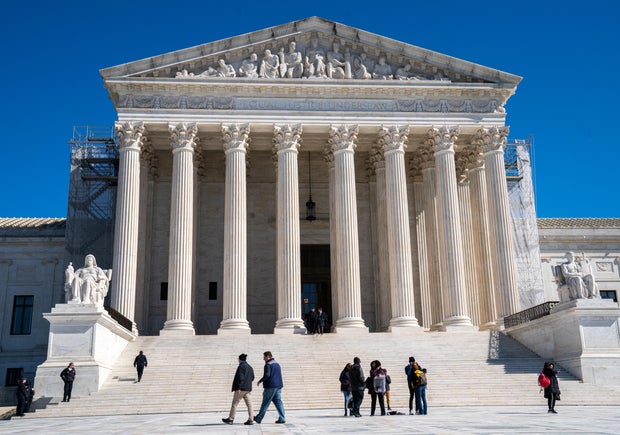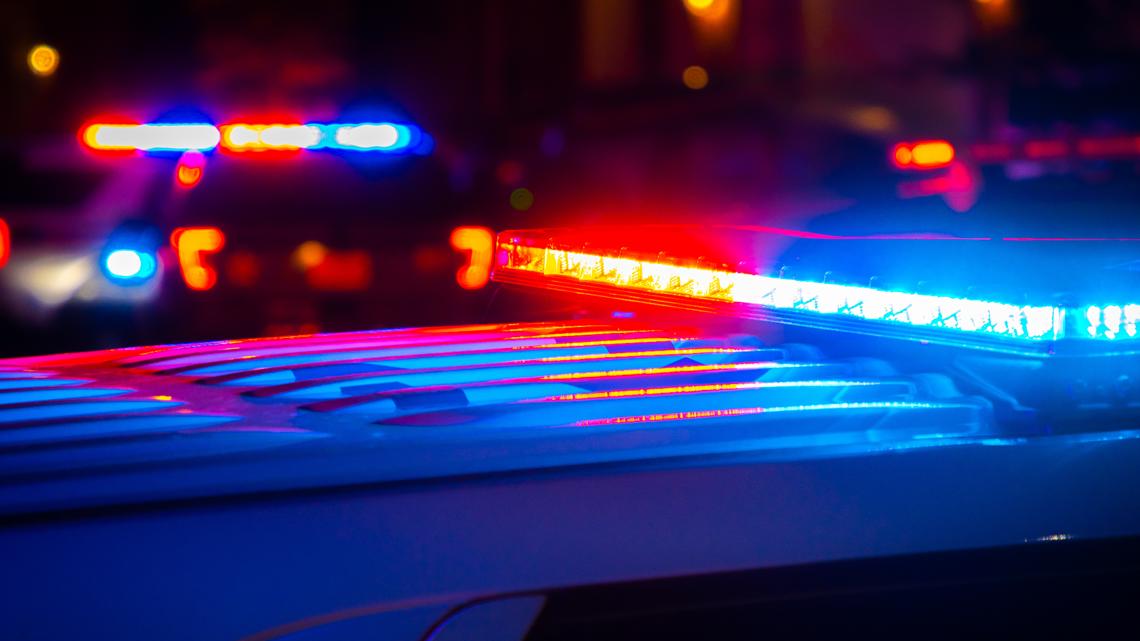CBS News
How Trump’s immunity case got to the Supreme Court: A full timeline

Washington — The Supreme Court is set to convene Thursday to consider whether former President Donald Trump is entitled to sweeping immunity from criminal prosecution for what he says were official acts taken while he occupied the White House.
The outcome of the dispute, known as Trump v. U.S., will have ramifications for the case brought against the former president in Washington, D.C., by special counsel Jack Smith, who alleges Trump engaged in an unlawful scheme to overturn the results of the 2020 election.
A ruling in Trump’s favor would bring the prosecution to an end. But if Smith prevails and Trump’s claims of immunity are rejected, proceedings in the case, which have been paused for months, would pick back up, although it’s unclear how quickly it would go to trial.
A victory for the special counsel would significantly raise the stakes of the 2024 election for Trump, since he could order the Justice Department to drop the case if reelected to the White House.
The origins of Trump’s immunity claim date back to last fall, when his attorneys first raised the issue. The Supreme Court’s decision is expected by the end of June. Here’s how the case arrived before the justices:
2023
Aug. 1: Trump is indicted on four counts in federal court in Washington. Prosecutors allege he and others orchestrated a scheme to keep him in power despite losing the 2020 presidential election.
Aug. 3: Trump pleads not guilty to all four counts before a federal magistrate judge.
Roberto Schmidt / Getty Images
Oct. 5: Trump’s attorneys file a motion to dismiss the charges against him based on presidential immunity. In their 52-page filing, they argue that he is entitled to absolute immunity, in part to ensure that presidents can serve “unhesitatingly, without fear” of future prosecution by political opponents for decisions they dislike.
Defense attorneys argue that the conduct alleged in the indictment lies “at the heart” of Trump’s official responsibilities as president.
Oct. 19: Prosecutors with Smith’s team oppose Trump’s bid to toss out the indictment on immunity grounds. In a 54-page filing, they tell the U.S. District Court for the District of Columbia that neither the Constitution nor Supreme Court precedent supports the sweeping immunity he asserted.
They argue that a former president may be investigated, indicted, tried and, if convicted, punished for conduct committed while in office. They also refute Trump’s characterization of his efforts to subvert the transfer of presidential power, writing that he took those actions in his capacity as a candidate for elective office.
Trump, the special counsel writes, allegedly acted deceitfully or corruptly to secure a personal benefit to himself as a presidential candidate, “not to carry out constitutional obligations entrusted to the presidency.”
Dec. 1: U.S. District Judge Tanya Chutkan denies Trump’s request to dismiss the charges based on presidential immunity, finding that the Constitution doesn’t support his contention that he is entitled to sweeping protection from prosecution for official acts.
“Whatever immunities a sitting president may enjoy, the United States has only one chief executive at a time, and that position does not confer a lifelong ‘get-out-of-jail-free’ pass,” Chutkan writes in her decision. “Former Presidents enjoy no special conditions on their federal criminal liability.”
Trump, she continues, may face federal investigation, indictment, prosecution, conviction and punishment for any criminal acts taken while in office.
Dec. 7: Trump appeals Chutkan’s decision to the U.S. Court of Appeals for the District of Columbia Circuit, and asks her to pause proceedings pending the appellate court’s review.
Dec. 11: Smith asks the Supreme Court to bypass the D.C. Circuit and swiftly decide whether Trump can be criminally charged for allegedly illegal acts committed while in the White House.
The special counsel tells the justices that it’s of “imperative public importance” that the Supreme Court resolve Trump’s claims of immunity and, if they are rejected, for his trial to proceed “as promptly as possible.”
Smith asks the high court to intervene in the case before the D.C. Circuit can hear arguments on whether Trump is entitled to sweeping immunity and issue a decision.
Dec. 13: Chutkan grants Trump’s request to pause the proceedings in the case, but says that a limited gag order and an order governing the use of “sensitive” information in the case remain in force.
Dec. 22: The Supreme Court denies Smith’s bid to fast-track the immunity case and leap-frog the D.C. Circuit, leaving the dispute before the appeals court.
2024
Jan. 9: A panel of three judges on the D.C. Circuit hears arguments on whether Trump is shielded from criminal prosecution. The judges assigned to the case are Judges Karen LeCraft Henderson, Michelle Childs and Florence Pan.
Henderson was appointed to the D.C. Circuit by President George H.W. Bush. Childs and Pan were tapped by President Biden.
During arguments, the judges question the limits of Trump’s claims of broad immunity, including whether a president who orders the military to assassinate a political rival would be shielded from prosecution.
Jabin Botsford/The Washington Post via Getty Images
Feb. 6: The three-judge panel unanimously rules that Trump is not entitled to broad immunity from prosecution.
“For the purpose of this criminal case, former President Trump has become citizen Trump, with all of the defenses of any other criminal defendant,” the judges said in their decision. “But any executive immunity that may have protected him while he served as President no longer protects him against this prosecution.”
The judges rule that Trump is not entitled to presidential immunity for “assertedly official acts,” and write that they “cannot accept former President Trump’s claim that a president has unbounded authority to commit crimes that would neutralize the most fundamental check on executive power — the recognition and implementation of election results.”
“It would be a striking paradox if the president, who alone is vested with the constitutional duty to ‘take Care that the Laws be faithfully executed,’ were the sole officer capable of defying those laws with impunity,” the panel writes.
The judges give Trump until Feb. 12 to ask the Supreme Court to pause their decision.
Feb. 12: Trump seeks emergency relief from the Supreme Court, asking the justices to pause the D.C. Circuit’s ruling.
In a filing, the former president’s lawyers write that without immunity from criminal charges, “the presidency as we know it will cease to exist.”
They accuse the special counsel of seeking to force Trump into a lengthy criminal trial at the height of the presidential campaign, which would keep him off the campaign trail.
Feb. 14: Smith urges the Supreme Court to reject Trump’s request for emergency relief and allow the D.C. Circuit’s ruling to stand. Doing so would clear the way for the trial in the 2020 election case to proceed.
But the special counsel tells the justices that if they believe Trump’s immunity claim warrants its review, they should take up the case on an expedited basis. He suggests the court set a schedule that would allow for oral arguments in March and an opinion shortly after.
Smith writes that if Trump is granted absolute immunity, it would upend understandings about presidential accountability that have prevailed throughout history while undermining democracy and the rule of law.”
Feb. 28: The Supreme Court agrees to decide whether Trump is entitled to presidential immunity from prosecution for acts allegedly committed while in office.
Robert Nickelsberg / Getty Images
The unsigned order specifies the question that the justices will consider: “whether and if so to what extent does a former president enjoy presidential immunity from criminal prosecution for conduct alleged to involve official acts during his tenure in office.”
It also sets arguments for the week of April 22. The court indicates that proceedings in the case will remain on hold until it issues a decision, expected by the end of June.
March 19: In his opening brief to the Supreme Court, Trump’s lawyers urge the justices to reverse the D.C. Circuit’s decision and find that former presidents are immune from criminal prosecution.
“From 1789 to 2023, no former, or current, president faced criminal charges for his official acts — for good reason,” Trump’s lawyers told the court. “The president cannot function, and the presidency itself cannot retain its vital independence, if the president faces criminal prosecution for official acts once he leaves office.”
They argue that allowing a former president to be criminally charged would impact future office-holders.
“Once our nation crosses this Rubicon, every future president will face de facto blackmail and extortion while in office, and will be harassed by politically motivated prosecution after leaving office, over his most sensitive and controversial decisions,” Sauer wrote. “That bleak scenario would result in a weak and hollow President, and would thus be ruinous for the American political system as a whole.”
April 8: The special counsel files his brief to the Supreme Court, arguing that Trump’s alleged scheme to subvert the transfer of presidential power was outside the duties of his office.
“No presidential power at issue in this case entitles the president to claim immunity from the general federal criminal prohibitions supporting the charges: fraud against the United States, obstruction of official proceedings, and denial of the right to vote,” Smith and his team write. “The president’s constitutional duty to take care that the laws be faithfully executed does not entail a general right to violate them.”
The special counsel and his fellow prosecutors tell the justices that Trump’s alleged attempt to stay in power after the 2020 election “frustrates core constitutional provisions that protect democracy.”
They also write that even if the Supreme Court finds immunity can be extended to a former president’s “official acts,” Trump could still be prosecuted since the allegations against him deal with a “private scheme with private actors to achieve a private end: petitioner’s effort to remain in power by fraud.”
April 25: The Supreme Court will hear arguments in Trump v. United States. D. John Sauer is set to argue on behalf of Trump and Michael Dreeben will appear for the special counsel.
CBS News
One year after Oct. 7 attack, the toll on civilians remains high

Watch CBS News
Be the first to know
Get browser notifications for breaking news, live events, and exclusive reporting.
CBS News
Open: This is “Face the Nation with Margaret Brennan,” Oct. 6, 2024

Watch CBS News
Be the first to know
Get browser notifications for breaking news, live events, and exclusive reporting.
CBS News
Kamala Harris will speak with “60 Minutes” tomorrow. Here’s what to know for the interview.

Voters will get the chance to hear from Vice President Kamala Harris on Monday as she presents her case for why she should be president in a “60 Minutes” election special.
For decades, “60 Minutes” has featured both Republican and Democratic nominees for presidents, but this year, former President Donald Trump backed out after previously indicating he would be on the show. Correspondent Scott Pelley, who’d been set to interview Trump, will instead travel to Arizona’s Maricopa County, home to more than 60% of Arizona’s voters and a critical battleground in a key swing state.
One thing is certain about the election; with the U.S. deeply involved in both the wars in Ukraine and the Middle East, whoever wins on Nov. 5 will become a wartime president.
What Harris will discuss
Israel’s war started one year ago after Hamas launched a surprise terror attack and correspondent Bill Whitaker will discuss the ongoing war with Harris.
Harris will also discuss the economy, immigration, her record as vice president and the differences between herself and Trump.
Democratic vice presidential candidate Gov. Tim Walz will also appear.
Whitaker joined the Democratic ticket on the campaign trail this week to gain insight into their platform’s priorities and values, and what the candidates believe voters should know.
Why Trump pulled out of the “60 Minutes” interview
Leading up to the candidate hour, Trump, through campaign spokespeople, was the first candidate to accept the “60 Minutes” request to be interviewed for the special, according to CBS News. It had been agreed that both candidates would receive equal time during the broadcast.
Trump last sat down with 60 Minutes in 2020. He walked out during the interview with Lesley Stahl. Trump referenced the incident on Tuesday night at a Milwaukee press conference when asked about his decision not to participate in the Oct. 7 “60 Minutes” election special.
“Well, right now, I went to – they came to me and would like me to do an interview, but first I want to get an apology, because the last time I did an interview with them, if you remember, they challenged me on the computer,” Trump said. “They said the ‘laptop from hell’ was from Russia, and I said it wasn’t from Russia. It was from Hunter, and I never got an apology, so I’m sort of waiting. I’d love to do ’60 Minutes.’ I do everything.”
The Republican nominee for president emphasized that he felt he was owed an apology from “60 Minutes.”
“Let’s see if they do it. I wouldn’t mind doing 60,” Trump continued. “I’ve done ’60 Minutes’ a lot.”
In a statement on Tuesday, Trump campaign communications director Steven Cheung said that Trump’s team had not agreed to an interview.
“Fake News,” Cheung said in a post on X. “60 Minutes begged for an interview, even after they were caught lying about Hunter Biden’s laptop back in 2020. There were initial discussions, but nothing was ever scheduled or locked in. They also insisted on doing live fact checking, which is unprecedented.”
Previous Trump, Harris appearances on 60 Minutes
Trump previously sat down with “60 Minutes'” Mike Wallace in 1985, Pelley in 2015 and Lesley Stahl twice in 2016, first in July of that year and then again in November of 2016. He also spoke with Stahl again in 2018 and 2020.
Harris previously sat down with Whitaker last year. She also was interviewed by Norah O’Donnell, “CBS Evening News” anchor and “60 Minutes” contributing correspondent, in 2020.





